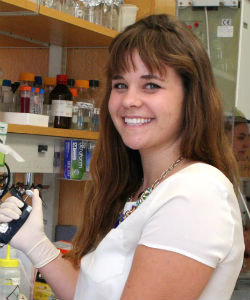
Oakleigh Folkes, Ph.D.
Department: Pharmacology, 2020
Faculty Mentor: Sachin Patel, Ph.D.
Dissertation Title: Investigations of the role of basolateral amygdala-nucleus accumbens circuit and endocannabinoid regulation of social interaction behavior in the Shank3B-/-model of autism spectrum disorder
Dissertation Abstract: Deficits in social interaction (SI) are a core symptom of Autism Spectrum Disorders (ASD), however treatments for social deficits are notably lacking. Elucidating brain circuits and neuromodulatory signaling systems that regulate sociability could facilitate a deeper understanding of ASD pathophysiology and reveal novel treatments for ASD. Here we found that in vivo optogenetic activation of the basolateral amygdala-nucleus accumbens (BLA-NAc) glutamatergic circuit reduced SI and increased social avoidance in mice. Furthermore, we found that 2-arachidonoylglycerol (2-AG) endocannabinoid (eCB) signaling reduced BLA-NAc glutamatergic activity, and that pharmacological 2-AG augmentation via administration of JZL184 blocked SI deficits associated with in vivo BLA-NAc stimulation. Additionally, optogenetic inhibition of the BLA-NAc circuit significantly increased SI in the Shank3B-/-, an ASD model with substantial SI impairment, without affecting SI in wild-type mice. Finally, we demonstrated that JZL184 delivered systemically or directly to the NAc also normalized SI deficits in Shank3B-/- mice, while ex vivo JZL184 application corrected aberrant NAc excitatory and inhibitory neurotransmission and reduced BLA-NAc-elicited feedforward inhibition of NAc neurons in Shank3B-/- mice. These data reveal circuit-level and neuromodulatory mechanisms regulating social function relevant to ASD and suggest 2-AG augmentation could reduce social deficits via modulation of excitatory and inhibitory neurotransmission in the NAc.